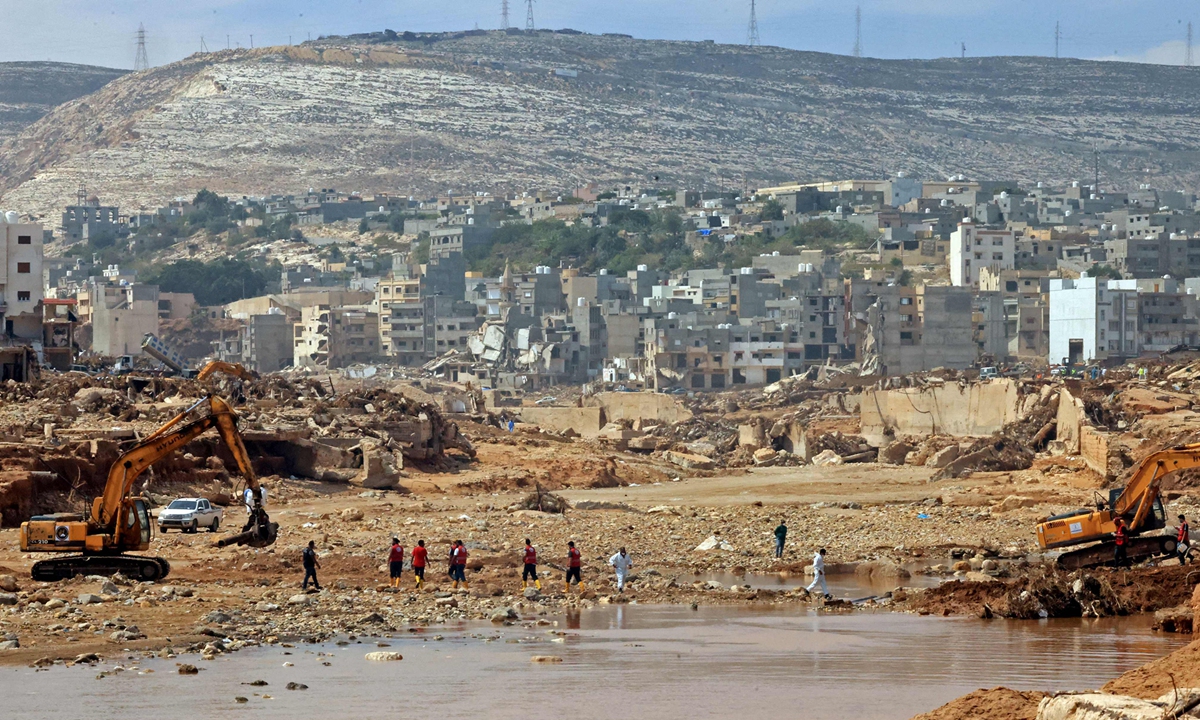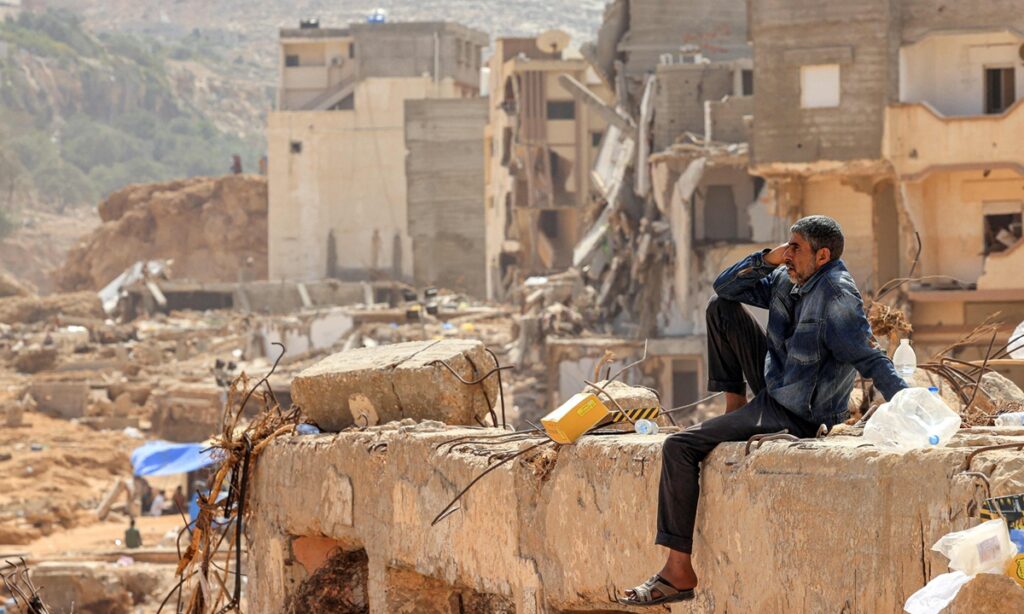Deluge in Derna, tears of Libyans
On September 10, tropical storm Daniel – an intense Mediterranean hurricane or “medicane” – made landfall in Libya, causing severe flooding in coastal areas resulting in extensive damage. The city of Derna, which was the hardest hit, has seen at least 20 percent of its infrastructure completely destroyed, and a large number of residents have been swept away by flood waters. On Monday, the Chinese government announced that it would provide 30 million yuan ($ 4.1 million) in emergency humanitarian aid to Libya to assist in the rescue efforts.
Western media outlets have been closely following the severe flooding in the North African nation, but many attributed it to climate change and the internal political turmoil in the country. However, experts have pointed out that such summations fail to recognize the real “culprit” behind the internal division and turmoil in Libya – Western forces, led by the US.
Twelve years ago, Western countries conducted a so-called “humanitarian intervention” in Libya, and left the wounds inflicted on the Libyan people. The resultant scars from the conflict have once again been laid bare for the world to see by the hurricane.
A forgotten city

Rescue teams assist in relief work in Libya’s eastern city of Derna following deadly flash floods, on September 17, 2023. Photo: VCG
After making landfall in Libya on September 10, tropical storm Daniel, with fierce winds and sudden heavy rain, caused heavy flash flooding in several northeastern areas of the country, with the coastal city of Derna hardest hit.
The Libyan National Agency for Bridges and Roads said on Monday that 70 percent of infrastructure in the flood-hit areas in eastern Libya was damaged. In addition, 50 percent of the roads in the region were also damaged, with alternative routes opened in disaster areas to allow traffic flow. The storm has, so far, claimed at least 5,500 lives with another 10,000 reported missing, official statistics showed.
Johr Ali, a Libyan reporter, told the BBC that people in Derna are living through “doomsday.” Ali said that his entire families had been washed away by the powerful flood waters. He also told the BBC that a friend found his “nephew dead in the street, thrown away by water from his rooftop.”
The havoc currently being witnessed in Libya today is in stark contrast to what a Global Times reporter saw in the country more than a decade ago. When the Global Times reporter was in Libya in 2010 and reported on the “Pentapolis of Ancient Greek Colonies” in the Cyrenaica region in the east of the country, Derna was an important stop. Derna was founded over 2,000 years ago and is situated against the backdrop of the Green Mountains, stretching over 100 kilometers along the coast, facing the Mediterranean Sea. Under Roman rule, it served as a populous and religious center in the Cyrenaica region. In modern times, Derna has cemented its place as one of the wealthiest areas in the North Africa.
Due to its unique location at the intersection of the Green Mountains, the sea, and the Sahara Desert, Derna’s climate is warm and humid. Following the winding mountain road for dozens of kilometers, a spectacular view of Derna, which looks like a “delta” is revealed, when viewed from the top of the mountain road.
Upon entering the city of Derna, the clean streets and well-planned buildings added a layer of orderly beauty to the city. From the perspective of urban governance, Derna’s level of city management surpassed that of the largest eastern city of Benghazi during the era of former Libyan leader Muammar Gaddafi.
However, the city which was the seat of an ancient civilization was unable to withstand the test of the recent brutal natural disaster. The report published by Yale Climate Connections pointed out that the floods in Libya are a climate and infrastructure catastrophe.
It stated that the catastrophe in Libya is the seventh weather-related disaster to kill at least 500 Africans since 2022, an astonishing 23 percent of Africa’s 30 deadliest weather-related disasters since 1900 have occurred in the last two years. This ominous figure could well be a harbinger of the future, as higher levels of vulnerability, a growing population, and more extreme weather events from climate change cause an increase in the occurrence of deadly disasters.
“Libya has been beset by chaos since forces backed by the West’s NATO military alliance overthrew long-serving ruler Col Muammar Gaddafi in October 2011,” read the BBC report.
“Since the fall of Gaddafi, Libya has been split between two rival governments and mired in conflict between numerous different militias,” it said.
Analysts pointed out that due to the political split in Libya, local officials have little interest in taking care of infrastructure in the country. Derna is now a forgotten ancient city.
The UN-backed Government of National Unity, led by Prime Minister Abdul Hamid Dbeibah, governs the western capital city of Tripoli in Libya. In eastern Libya, including the regions which were most impacted by the floods, a rival administration called the House of Representatives holds power. Additionally, it has control over numerous southern areas, primarily consisting of uninhabited desert, according to media reports.
Local official said that the two dams that burst in a storm had been cracked since 1998. Gaddafi’s regime once entrusted repair work of the dam to a Turkish company, but the company did not start the work until 2010 due to payment issues. The project halted less than five months after the revolution that led to
Gaddafi’s downfall, reported the Straits Times.
According to the report, while every year a budget has been allocated to repair the two dams, “none of the successive governments since 2011 have undertaken the work.”
Culpability for the disaster

French navy technicians prepare a BGU 12 bomb to be attached onto a Rafale jet fighter on the French aircraft carrier Charles De Gaulle, on March 25, 2011, for a mission to Libya. Photo: AFP
Analysts pointed out that the West failed to acknowledge culpability for the Libyan disaster. More insidiously, Western powers have tried to spread the narrative that Libyans, or even Arabs and Africans, are inherently incapable of properly running their own affairs.
In the last decade of the Gaddafi regime, the country’s economy was robust, while the government increased direct investment into its citizenry with the introduction of foreign investment, the construction of free or cheap housing, and creation of dynamic solutions to unemployment and the housing needs of the country’s youth.
“[As for] such a serious disaster, its root and initial cause lies in the US force intervention in Libya’s internal affairs, which forcibly overthrew the Gaddafi regime. If the Libyan regime was stable, it would certainly not be so passive in its ability to cope with the flooding, resulting in a large number of lives being lost and property swallowed up by the flooding,” AlJab Ala, a columnist for the Egyptian newspaper Al-Ahram, told the Global Times.
In 2011, the US and other Western countries intervened militarily in Libya and supported the opposition in overthrowing the Gaddafi regime. Since then, Libya has been plunged into a prolonged civil war, and the multinational intervention has led to the emergence of two mutually hostile regimes in the country, where economic development and the development of people’s livelihoods have been neglected, along with infrastructure disrepair.
Libya has the largest proven oil reserves in Africa and its economy has long been dependent on the energy sector. Statistics from the Joint Organizations Data Initiative show that Libya’s oil production fell from 1.48 million barrels per day to 290,000 barrels per day in the first weeks of the war and to 22,000 barrels per day in July 2011, at the height of the conflict. In addition, Libya’s oil fields and pipelines are located in the jurisdictions of different factions and tribes, and the different regions have fought over their interests and even sabotaged and obstructed each other.
Zhang Chuchu, deputy director of the Centre for Middle Eastern Studies at Fudan University, told the Global Times that in Libya’s regime reconstruction, Western powers were committed to the implementation of a Western-style democratic system in the country, fostering a pro-Western government, and that this forced system transplantation not only failed to address the equitable distribution of power but also exacerbated the political struggles and social disparities.
Observers noted that economic and political instability has led to the deterioration of security in Libya. At the civilian level, there have been frequent incidents of armed conflict and other forms of vicious violence; at the State regime level, the remnants of the former regime and different factions within the opposition continue to fight for power and profit. In addition, extremist organizations represented by the Al Qaeda in the Islamic Maghreb have further aggravated social unrest.
In 2014, in the face of the increasingly severe security situation in Libya, Western countries closed their embassies and consulates in Libya in rapid succession and evacuated their countries’ nationals. Libya has been in disarray since then, Li Haidong, a professor at the China Foreign Affairs University, told the Global Times.
Mired in catastrophic dilemma
“The claim that Washington or Britain cared about the welfare of ordinary Libyans is disproved by a decade of indifference to their plight-culminating in the current suffering in Derna,” remarked Monthly Review, an independent US magazine.
Ironically, when the United States Agency for International Development (USAID) announced a mere $1 million in initial humanitarian assistance to Libya shortly after the floods hit, online public opinion criticized the US for being “miserly” in its assistance by focusing only on destruction and not on construction.
Zhang told the Global Times that the US and its led West, in addition to directly and forcefully changing Libya’s original political and security order, triggering subsequent turmoil, its ability to shape Libya’s new order continues to decline.
Regional competition, however, continues to intensify, placing Libya at a marked disadvantage when measured against its neighbors. Although there has been some progress in Libya’s political process, such as the signing of ceasefire agreements, the organizing of talks, and holding of elections, under the active mediation of the United Nations and multiple countries, the country still faces significant challenges.
Zhang believes that Libya’s politics, economy, and society have long been mired in a catastrophic dilemma, in which the ideological separation that exists between the East and the West is now tenuous.
“If the eastern and western factions in Libya continue to have the ability and willingness to maintain their own operations under external influence, it will be difficult to discuss national construction and social integration. Therefore, the way forward for Libya lies in simultaneous improvements in both internal and external environments, ultimately leading to an inclusive power structure,” she said.
(Global Times)



